托福TPO53听力Conversation1文本+题目+答案解析
- 格式:pdf
- 大小:57.99 KB
- 文档页数:5
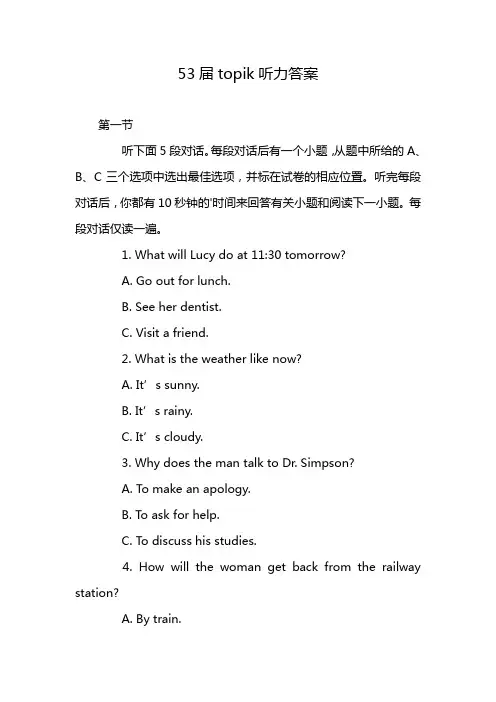
53届topik听力答案第一节听下面5段对话。
每段对话后有一个小题,从题中所给的A、B、C三个选项中选出最佳选项,并标在试卷的相应位置。
听完每段对话后,你都有10秒钟的'时间来回答有关小题和阅读下一小题。
每段对话仅读一遍。
1. What will Lucy do at 11:30 tomorrow?A. Go out for lunch.B. See her dentist.C. Visit a friend.2. What is the weather like now?A. It’s sunny.B. It’s rainy.C. It’s cloudy.3. Why does the man talk to Dr. Simpson?A. To make an apology.B. To ask for help.C. To discuss his studies.4. How will the woman get back from the railway station?A. By train.B. By car.C. By bus.5. What does Jenny decide to do first?A. Look for a job.B. Go on a trip.C. Get an assistant.第二节听下面5段对话或独白。
每段对话或独白后有几个小题,从题中所给的A、B、C三个选项中选出最佳选项,并标在试卷的相应位置。
听每段对话或独白前,你将有时间阅读各个小题,每小题5秒钟;听完后,各小题将给出5秒钟的作答时间。
每段对话或独白读两遍。
听第6段材料,回答第6、7题。
6. What time is it now?A. 1:45.B. 2:10.C. 2:15.7. What will the man do?A. Work on a project.B. See Linda in the library.C. Meet with Professor Smith.听第7段材料,回答第8至10题。
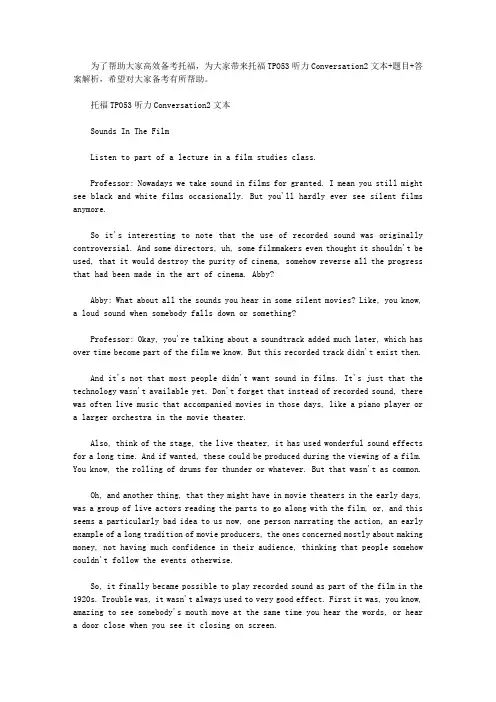
为了帮助大家高效备考托福,为大家带来托福TPO53听力Conversation2文本+题目+答案解析,希望对大家备考有所帮助。
托福TPO53听力Conversation2文本 Sounds In The Film Listen to part of a lecture in a film studies class. Professor: Nowadays we take sound in films for granted. I mean you still might see black and white films occasionally. But you'll hardly ever see silent films anymore. So it's interesting to note that the use of recorded sound was originally controversial. And some directors, uh, some filmmakers even thought it shouldn't be used, that it would destroy the purity of cinema, somehow reverse all the progress that had been made in the art of cinema. Abby? Abby: What about all the sounds you hear in some silent movies? Like, you know, a loud sound when somebody falls down or something? Professor: Okay, you're talking about a soundtrack added much later, which has over time become part of the film we know. But this recorded track didn't exist then. And it's not that most people didn't want sound in films. It's just that the technology wasn't available yet. Don't forget that instead of recorded sound, there was often live music that accompanied movies in those days, like a piano player or a larger orchestra in the movie theater. Also, think of the stage, the live theater, it has used wonderful sound effects for a long time. And if wanted, these could be produced during the viewing of a film. You know, the rolling of drums for thunder or whatever. But that wasn't as common. Oh, and another thing, that they might have in movie theaters in the early days, was a group of live actors reading the parts to go along with the film, or, and this seems a particularly bad idea to us now, one person narrating the action, an early example of a long tradition of movie producers, the ones concerned mostly about making money, not having much confidence in their audience, thinking that people somehow couldn't follow the events otherwise. So, it finally became possible to play recorded sound as part of the film in the 1920s. Trouble was, it wasn't always used to very good effect. First it was, you know, amazing to see somebody's mouth move at the same time you hear the words, or hear a door close when you see it closing on screen. But that luster wears off, of course. And if you're a director, a filmmaker, what's the next step? Abby: Well, you sound to enhance the movie right? Bring something more to it that wasn’t possible? Professor: Yes. That’s exactly what directors, who were more interested in cinema as art, not commerce, were thinking. But they also predicted that there would be a problem that sound would be misused and, boy, was it ever.Because the commercial types, the producers and so on, were thinking, “Okay. Now that sound is possible, let's talk as much as possible and forget about the fact that we're making a movie, that we have this powerful visual medium.” So many of the films of the twenties were basically straight adaptations of successful shows from the stage, theatre. The name they used for sound films then was “talking films” and that was on the mark, since, well, all they pretty much did was talk and talk. So, remedy? Well what was proposed by a number of filmmakers and theorists was the creative expressive use of sound, what they generally called nonsynchronous sound. Okay, synchronous sound means basically that what we hear is what we see. Everything on the soundtrack is seen on the screen. And everything was recorded simultaneously, which… Well, since the sound technicians working on films often had experience with live radio that made sense to them. Recording the sound separately and adding it in afterward? Well, that idea was less obvious. Anyway synchronous sound means the source of the sound is the image on the screen.Nonsynchronous sound then is… Abby: The sound doesn't match the picture? Professor: Right. Now we can look at this in various ways. But let's take it as literally as possible. Music, unless we see the radio or the orchestra, that's nonsynchronous. If the camera shot is of the listener rather than the speaker that's nonsynchronous. If we hear, say, background sounds that aren't on the screen, that's nonsynchronous. So, that doesn't seem so radical, does it? But again, those early producers didn't think their audiences could keep up with this.。
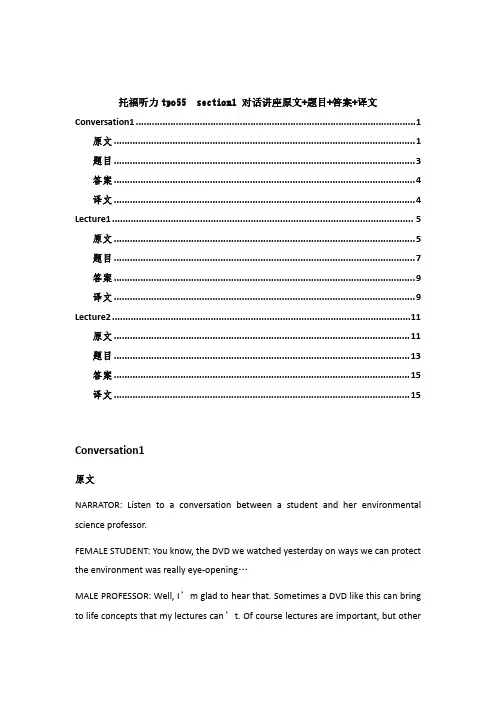
托福听力tpo55section1对话讲座原文+题目+答案+译文Conversation1 (1)原文 (1)题目 (3)答案 (4)译文 (4)Lecture1 (5)原文 (5)题目 (7)答案 (9)译文 (9)Lecture2 (11)原文 (11)题目 (13)答案 (15)译文 (15)Conversation1原文NARRATOR:Listen to a conversation between a student and her environmental science professor.FEMALE STUDENT:You know,the DVD we watched yesterday on ways we can protect the environment was really eye-opening…MALE PROFESSOR:Well,I’m glad to hear that.Sometimes a DVD like this can bring to life concepts that my lectures can’t.Of course lectures are important,but otherforms of presentation—like DVDs—help get across the concepts I want you to understand,too.FEMALE STUDENT:I agree.And the DVD got me thinking about the project you assigned.Now,I know we’re not supposed to work with anyone else for this assignment,but two of us think we have a really good idea.MALE PROFESSOR:OK,I’m listening.FEMALE STUDENT:Well,the student from class who I wanna work with—it’s Jessica Smith—you see,she has a part-time job at the hotel on campus…uh…where parents and people who are here for conferences stay?MALE PROFESSOR:Ah,yes.The environmental science department just hosted a conference not too long ago,and we had several attendees who stayed there.They really enjoyed staying at that hotel.FEMALE STUDENT:I’m sure.Jessica says it’s really nice,but it’s not so environmentally friendly.MALE PROFESSOR:Hmm…I see.Well,hotels may be reluctant to make changes to protect the environment if it could be perceived as negatively affecting the comfort of hotel guests.FEMALE STUDENT:Well,that has to do with our idea for the project.Uh…Jessica and I wanna do an assessment of the hotel and see what they can do to save energy, and create less pollution—without interfering with the positive experience of patrons.And I figured since she works there,it’d be easier for us to do the project together.Plus she already ran the idea by the hotel manager,and he’s on board with it.He was even telling her how he can use our work to apply for a grant from a local environmental foundation for money to make energy-saving upgrades and stuff!So we’d make recommendations,then he’d use our findings to make real changes.MALE PROFESSOR:That’s certainly a compelling idea—and it definitely fits within the general guidelines of the project.OK.Just give me an outline of what you plan todo,and,well,I’m a little worried.…I’ll still need you to submit the paper in the format we discussed in class,not whatever format the hotel manager might want.题目1.What is the conversation mainly about?A.A grant the student wants to apply forB.The student’s proposed plan for a class assignmentC.A project presented in a DVD the class watchedD.The student’s part-time job at a hotel2.What does the student ask the professor to allow her to do?A.Take extra time on her projectB.Write a grant rather than a paperC.Work with a partner on an assignmente her job as the focus of her project3.Why does the professor mention a science conference?A.To suggest that the student attend itB.To indicate that he is familiar with the hotelC.To state where he got information about a new discoveryD.To state where he got the video that he showed in class4.According to the conversation,why might the campus hotel managers be slow to adopt environmentally friendly policies?A.They are concerned that their customers may not be happy with the changes.B.They are not knowledgeable about the potential benefits.C.No financial help is available for reducing the initial cost of making the changes.D.They have tried to adopt such policies and found them of little use.5.What concern does the professor express?A.That the hotel manager might not allow the research to take place at the hotelB.That Jessica Smith might be too busy with her job to do the projectC.That the student’s idea for the project is overly ambitiousD.That the student might not focus on fulfilling all the requirements of the project答案B C B A D译文旁白:听一个学生和她的环境科学教授之间的对话。
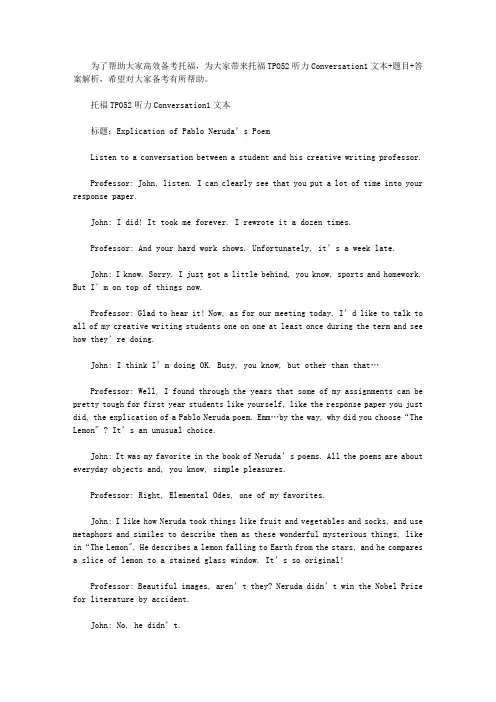
为了帮助大家高效备考托福,为大家带来托福TPO52听力Conversation1文本+题目+答案解析,希望对大家备考有所帮助。
托福TPO52听力Conversation1文本 标题:Explication of Pablo Neruda’s Poem Listen to a conversation between a student and his creative writing professor. Professor: John, listen. I can clearly see that you put a lot of time into your response paper. John: I did! It took me forever. I rewrote it a dozen times. Professor: And your hard work shows. Unfortunately, it’s a week late. John: I know. Sorry. I just got a little behind, you know, sports and homework. But I’m on top of things now. Professor: Glad to hear it! Now, as for our meeting today, I’d like to talk to all of my creative writing students one on one at least once during the term and see how they’re doing. John: I think I’m doing OK. Busy, you know, but other than that… Professor: Well, I found through the years that some of my assignments can be pretty tough for first year students like yourself, like the response paper you just did, the explication of a Pablo Neruda poem. Emm…by the way, why did you choose“The Lemon" ? It’s an unusual choice. John: It was my favorite in the book of Neruda’s poems. All the poems are about everyday objects and, you know, simple pleasures. Professor: Right, Elemental Odes, one of my favorites. John: I like how Neruda took things like fruit and vegetables and socks, and use metaphors and similes to describe them as these wonderful mysterious things, like in“The Lemon". He describes a lemon falling to Earth from the stars, and he compares a slice of lemon to a stained glass window. It’s so original! Professor: Beautiful images, aren’t they? Neruda didn’t win the Nobel Prize for literature by accident. John: No, he didn’t. Professor: Now, as you know, the paper was only the first half of the assignment, and I’m concerned about your ability to complete the second part on time, considering how much time the first part took you. John: Actually, I finished it just before I came here. Professor: Excellent! John: It was tricky, too. You know, having to write a poem inspired by “The Lemon", but in a completely different style. Professor: Right! John: In order to do that, I really had to study Neruda’s style and read a lot of his stuff, which was great, but“The Lemon" is free verse. So to do the assignment, I decided to use a strict meter——iambic pentameter, to be as different as possible. Professor: So each line of your poem has ten syllables and every other syllable is stressed. Interesting choice! Iambic pentameter is certainly different from free verse. John: It was hard for me though, because usually when I write a poem, I choose my own topic, and I just write. I don’t worry about counting syllables or anything. So, I’m kind of hoping we won’t have more assignments like this? Professor: Sorry to disappoint you, but these assignments are designed to get you out of your comfort zone, to get you reading and writing a wide variety of poetic styles. 托福TPO52听力Conversation1题目 1. What do the speakers mainly discuss? Methods that the professor uses to challenge her students Reasons that the student turned in his paper a week late The two parts of an assignment for a writing class Seldom discussed aspects of a famous poet's work 2. What reason does the professor give for wanting to meet with the student?。
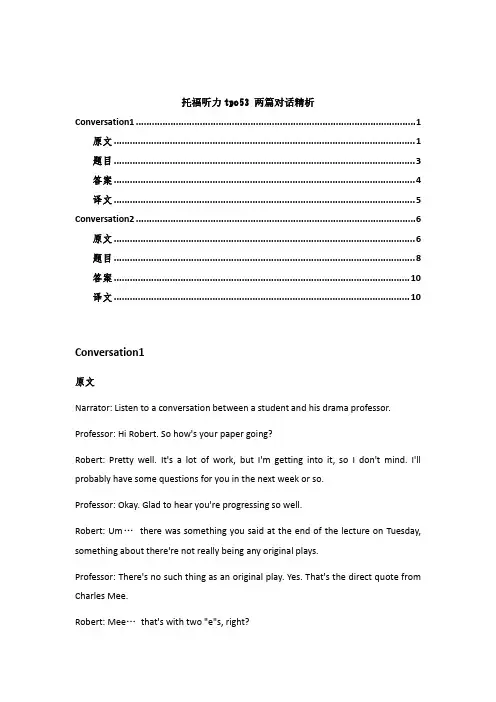
托福听力tpo53两篇对话精析Conversation1 (1)原文 (1)题目 (3)答案 (4)译文 (5)Conversation2 (6)原文 (6)题目 (8)答案 (10)译文 (10)Conversation1原文Narrator:Listen to a conversation between a student and his drama professor.Professor:Hi Robert.So how's your paper going?Robert:Pretty well.It's a lot of work,but I'm getting into it,so I don't mind.I'll probably have some questions for you in the next week or so.Professor:Okay.Glad to hear you're progressing so well.Robert:Um…there was something you said at the end of the lecture on Tuesday, something about there're not really being any original plays.Professor:There's no such thing as an original play.Yes.That's the direct quote from Charles Mee.Robert:Mee…that's with two"e"s,right?Professor:Yep.M-E-E.You'll probably be hearing a lot about him.He's becoming a pretty famous playwright.Robert:Yeah,well,I've been thinking about his quote.I mean there must be some original plays out there.Professor:I’ll grant that he's overstating things somewhat.But the theater does have a long tradition of borrowing.Take Shakespeare,like most writers of his day,he borrowed plots from other sources unabashedly.And the ancient Greeks,all the plays they wrote were based on earlier plays,poems and myths.Robert:And borrowing applies to plays being written nowadays,too?Professor:To some extent,yes.Mee,for example,he's made a career out of remaking plays,one of which we"ll be studying soon.It's called Full Circle and Mee based it on an earlier play by a German playwright.Robert:Oh Full Circle…wasn't that based on the Caucasian Chalk Circle?Professor:That's right.Robert:I remember hearing about that play from my acting coach.Professor:Okay.Well,the Caucasian Chalk Circle was based on a play by yet another German playwright,someone who was fascinated by the ancient literatures of China, India and Persia and many of his works were adapted from those literatures, including his version of the Chalk Circle which was based on an early Chinese play.Robert:So this Full Circle play,by Charles Mee,the one we're going to study,it's like the third or fourth remake.Wow…And we complain that Hollywood keeps making the same movies over and over again.Professor:Well,part of what Mee's trying to do is drive home the point that:One, theater's always a collaborative effort.Robert:Well,yeah,the playwright,the director and the actors,people have to work together to produce a play.Professor:Yes,of course.But Mee means historically.The dramatic literature of early periods is hugely influential in shaping later dramatic works.Robert:So it's like when the playwright bases a play on a previous playwrights theme or message.It's like they're talking to each other,collaborating.Uh,just not at the same time right?Professor:Exactly.And the second point Mee's trying to make,I think,is that it's legitimate to retell an old story in a new way,in a way that's,uh…a more in line with contemporary concerns.So when playwrights reinvent or update an earlier play it shouldn't be construed as a lack of imagination or an artistic failure.题目1.Why does the man go to see the professor?A.To discuss a play he heard aboutB.To get feedback on a paper he is writingC.To ask about a point made in classD.To get information about an acting coach2.Why does the professor mention Shakespeare and the ancient Greek playwrights?A.To support her statement that some original plays do existB.To show that playwrights historically have used themes from earlier playsC.To point out that Shakespeare was greatly influenced by ancient Greek playsD.To give examples of playwrights whose plays have inspired later playwrights3.What does the professor imply about the play Full Circle by Charles Mee?A.It served as the basis for a Hollywood film.B.It is indirectly based on a Chinese play.C.It has influenced a more recent play.D.It uses themes from ancient Greek literature.4.What two points does Charles Mee make about playwriting?[Click on2answers.]A.Rewriting old plays to deal with modern issues is a respectable practice.B.Playwrights should preserve as much of the original as possible when updating an older play.C.Older plays tend to show more imagination than newer plays.D.In a way,modern playwrights work with playwrights of the past.5.What does the man imply when he says this:(MALE STUDENT):[doubtful]I mean, there must be some original plays out here.A.He thinks the professor misunderstood his point.B.He has written some original plays himself.C.He doubts that what Charles Mee said is true.D.He has read some original plays by Charles Mee.答案C B B AD C译文Narrator:请听一段学生和他的戏剧教授的对话。

托福听力tpo57section1对话讲座原文+题目+答案+译文Conversation1 (1)原文 (1)题目 (3)答案 (5)译文 (5)Lecture1 (5)原文 (5)题目 (7)答案 (9)译文 (9)Lecture2 (11)原文 (11)题目 (13)答案 (15)译文 (15)Conversation1原文NARRATOR:Listen to a conversation between a student and a professor.FEMALE PROFESSOR:Hi Eric,how are things going?MALE STUDENT:Oh,I’m really busy with my workload.Some professors assign so much reading that…It’s like they think we have no other homework.FEMALE PROFESSOR:One of the most important things you’ll learn in college is how to manage your time.How to,you know,prioritize.When to say no to a socialengagement if you have a paper due,that sort of thing.MALE STUDENT:I guess so.FEMALE PROFESSOR:So,how are you finding the material we’re covering in class?MALE STUDENT:I’ve actually come to talk to you about it.I have a six-month-old niece,so I find early childhood development really interesting.Piaget—that Swiss psychologist you told us about—his development theory is really cool.FEMALE PROFESSOR:Yes—his theory that cognitive development in children occurs in four stages that you can,ah,actually observe.MALE STUDENT:Yeah,um,so my niece,she’s in the,um,sen-sor-i-motor stage now, right at the part where she thinks things disappear when they’re out of sight.FEMALE PROFESSOR:Very good.She probably won’t understand that objects continue to exist even when they’re out of sight until she’s a month or so older.MALE STUDENT:Yeah.Yesterday,we were knocking a little ball around,and it rolled under the couch.She immediately lost interest and reached for something else.FEMALE PROFESSOR:Because to her,the ball ceased to exist.MALE STUDENT:Yeah.I’ve actually been taking notes on her behavior because I’d like to write my term paper about her,if it’s OK with you.FEMALE PROFESSOR:Your term paper?MALE STUDENT:Yeah,I’d like to do a case study or something.Piaget watched his kids and,like,changed the whole world of psychology.FEMALE PROFESSOR:Wait a minute.Piaget didn’t just observe his own children.He did exhaustive research over thirty years to develop and test his theory.And anyway, your assignment isn’t to do a study;it’s to research the literature on a particular psychological topic and write about it.And I gave you a list of suggested topics to choose from.MALE STUDENT:Well,what if I researched something like:Is it possible to speed up, uh,cognitive development?Like,if I reached under the couch to get the ball while she watched me,would she learn earlier that objects don’t disappear?Or can’t six-month-old babies think that way yet?FEMALE PROFESSOR:Uh,umm…I do applaud your initiative,Eric.However,I sincerely doubt you could get any kind of valid or meaningful information from such an experiment.MALE STUDENT:But I already put so much time into watching my niece.FEMALE PROFESSOR:Remember,this is only a freshman psychology class.You aren’t trained in carrying out an original research project.I wish you had come to me earlier, but,you know,there’s still some time before the due date.I suggest that you recheck the list of topics.At least one of them relates to cognitive development. Then come see me again if you have any questions.MALE STUDENT:OK.题目1.Why does the student go to see the professor?A.To request an extension of the due date of his term paperB.To ask about a theory he did not understand in classC.To discuss an idea for his term paper projectD.To get advice on how to prioritize his work2.Why does the student mention a particular stage in early childhood development?A.To show that his niece learns faster than other children in that stageB.To show that his niece displays behavior appropriate for that stageC.To point out that he does not agree with Piaget’s theory about that stageD.To point out that he does not fully understand how that stage can be observed3.Why does the professor discuss Piaget’s research method?A.To suggest that the student use the same methodB.To provide a criticism of Piaget’s theoryC.To supplement information provided in classD.To clarify the student’s assumption about what Piaget did4.Why does the professor reject the student’s proposal to write about his niece?[Click on2answers.]A.The proposal does not fulfill the requirements of the assignment.B.The proposal does not take Piaget’s theory into consideration.C.The student’s niece is too young to display the behaviors identified by Piaget.D.The student does not have sufficient training to conduct a worthwhile experiment.5.Why does the professor says this:would she learn earlier that objects don’t disappear?Or can’t six-month-old babies think that way yet?FEMALE PROFESSOR:Uh,umm…I do applaud your initiative,Eric.A.She does not have time to answer the student’s questions.B.She does not want to hurt the student’s feelings.C.She is pleased that the student thought of an original research project.D.She is impressed with the student’s understanding of the class material.答案C BD AD B译文旁白:听学生和教授之间的对话。
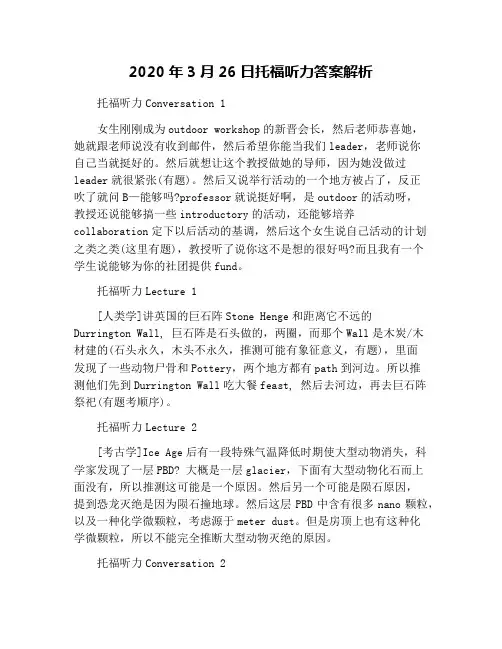
2020年3月26日托福听力答案解析托福听力Conversation 1女生刚刚成为outdoor workshop的新晋会长,然后老师恭喜她,她就跟老师说没有收到邮件,然后希望你能当我们leader,老师说你自己当就挺好的。
然后就想让这个教授做她的导师,因为她没做过leader就很紧张(有题)。
然后又说举行活动的一个地方被占了,反正吹了就问B—能够吗?professor就说挺好啊,是outdoor的活动呀,教授还说能够搞一些introductory的活动,还能够培养collaboration定下以后活动的基调,然后这个女生说自己活动的计划之类之类(这里有题),教授听了说你这不是想的很好吗?而且我有一个学生说能够为你的社团提供fund。
托福听力Lecture 1[人类学]讲英国的巨石阵Stone Henge和距离它不远的Durrington Wall, 巨石阵是石头做的,两圈,而那个Wall是木炭/木材建的(石头永久,木头不永久,推测可能有象征意义,有题),里面发现了一些动物尸骨和Pottery,两个地方都有path到河边。
所以推测他们先到Durrington Wall吃大餐feast, 然后去河边,再去巨石阵祭祀(有题考顺序)。
托福听力Lecture 2[考古学]Ice Age后有一段特殊气温降低时期使大型动物消失,科学家发现了一层PBD? 大概是一层glacier,下面有大型动物化石而上面没有,所以推测这可能是一个原因。
然后另一个可能是陨石原因,提到恐龙灭绝是因为陨石撞地球。
然后这层PBD中含有很多nano颗粒,以及一种化学微颗粒,考虑源于meter dust。
但是房顶上也有这种化学微颗粒,所以不能完全推断大型动物灭绝的原因。
托福听力Conversation 2学生改了topic题目(主旨题),一开始topic是古代北非burberry地区相关,但是因为时间太久远几乎找不到什么资料,教授推荐了个网址去搜资料。
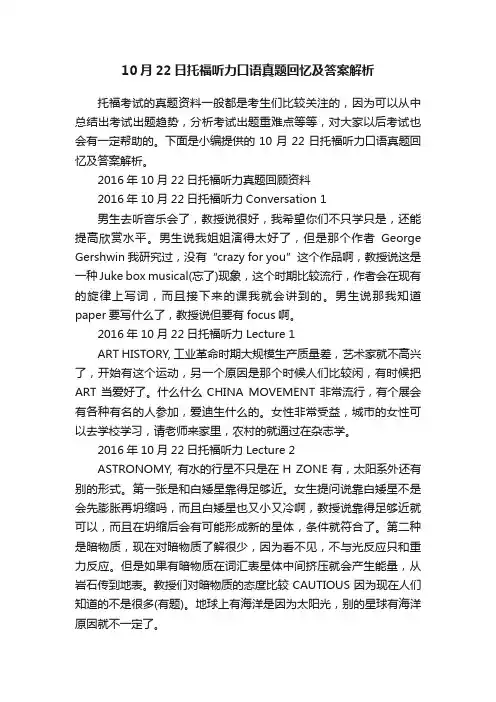
10月22日托福听力口语真题回忆及答案解析托福考试的真题资料一般都是考生们比较关注的,因为可以从中总结出考试出题趋势,分析考试出题重难点等等,对大家以后考试也会有一定帮助的。
下面是小编提供的10月22日托福听力口语真题回忆及答案解析。
2016年10月22日托福听力真题回顾资料2016年10月22日托福听力Conversation 1男生去听音乐会了,教授说很好,我希望你们不只学只是,还能提高欣赏水平。
男生说我姐姐演得太好了,但是那个作者George Gershwin我研究过,没有“crazy for you”这个作品啊,教授说这是一种Juke box musical(忘了)现象,这个时期比较流行,作者会在现有的旋律上写词,而且接下来的课我就会讲到的。
男生说那我知道paper要写什么了,教授说但要有focus啊。
2016年10月22日托福听力Lecture 1ART HISTORY, 工业革命时期大规模生产质量差,艺术家就不高兴了,开始有这个运动,另一个原因是那个时候人们比较闲,有时候把ART当爱好了。
什么什么CHINA MOVEMENT非常流行,有个展会有各种有名的人参加,爱迪生什么的。
女性非常受益,城市的女性可以去学校学习,请老师来家里,农村的就通过在杂志学。
2016年10月22日托福听力Lecture 2ASTRONOMY, 有水的行星不只是在H ZONE有,太阳系外还有别的形式。
第一张是和白矮星靠得足够近。
女生提问说靠白矮星不是会先膨胀再坍缩吗,而且白矮星也又小又冷啊,教授说靠得足够近就可以,而且在坍缩后会有可能形成新的星体,条件就符合了。
第二种是暗物质,现在对暗物质了解很少,因为看不见,不与光反应只和重力反应。
但是如果有暗物质在词汇表星体中间挤压就会产生能量,从岩石传到地表。
教授们对暗物质的态度比较CAUTIOUS因为现在人们知道的不是很多(有题)。
地球上有海洋是因为太阳光,别的星球有海洋原因就不一定了。
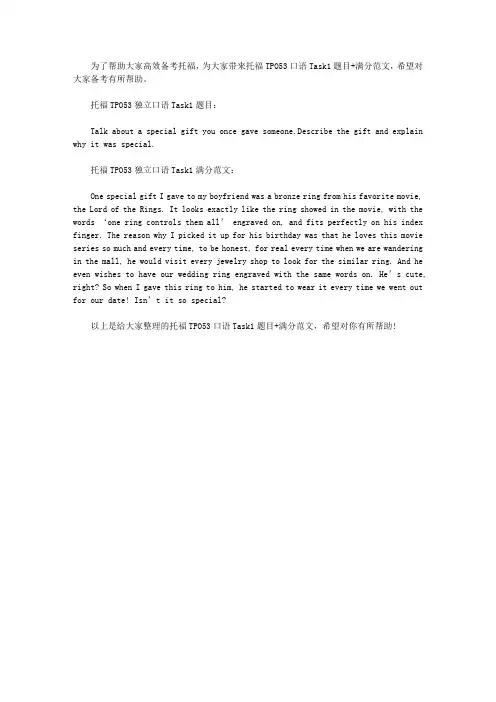
为了帮助大家高效备考托福,为大家带来托福TPO53口语Task1题目+满分范文,希望对大家备考有所帮助。
托福TPO53独立口语Task1题目: Talk about a special gift you once gave someone.Describe the gift and explain why it was special. 托福TPO53独立口语Task1满分范文: One special gift I gave to my boyfriend was a bronze ring from his favorite movie, the Lord of the Rings. It looks exactly like the ring showed in the movie, with the words ‘one ring controls them all’ engraved on, and fits perfectly on his index finger. The reason why I picked it up for his birthday was that he loves this movie series so much and every time, to be honest, for real every time when we are wandering in the mall, he would visit every jewelry shop to look for the similar ring. And he even wishes to have our wedding ring engraved with the same words on. He’s cute, right? So when I gave this ring to him, he started to wear it every time we went out for our date! Isn’t it so special? 以上是给大家整理的托福TPO53口语Task1题目+满分范文,希望对你有所帮助!。
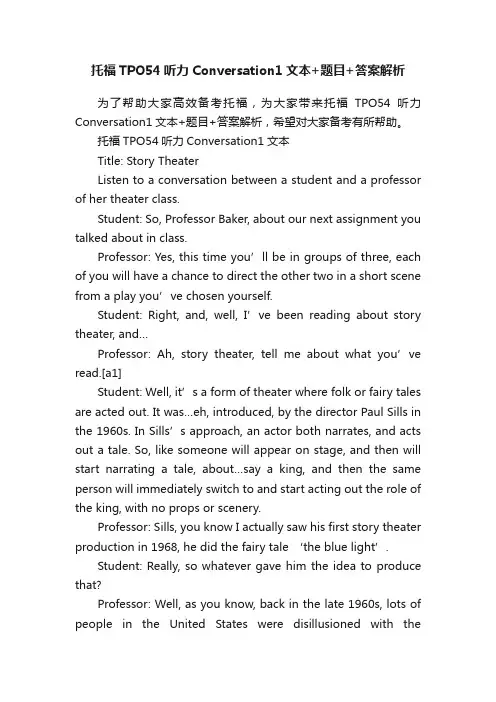
托福TPO54听力Conversation1文本+题目+答案解析为了帮助大家高效备考托福,为大家带来托福TPO54听力Conversation1文本+题目+答案解析,希望对大家备考有所帮助。
托福TPO54听力Conversation1文本Title: Story TheaterListen to a conversation between a student and a professor of her theater class.Student: So, Professor Baker, about our next assignment you talked about in class.Professor: Yes, this time you’ll be in groups of three, each of you will have a chance to direct the other two in a short scene from a play you’ve chosen yourself.Student: Right, and, well, I’ve been reading about story theater, and…Professor: Ah, story theater, tell me about what you’ve read.[a1]Student: Well, it’s a form of theater where folk or fairy tales are acted out. It was…eh, introduced, by the director Paul Sills in the 1960s. In Sills’s approach, an actor both narrates, and acts out a tale. So, like someone will appear on stage, and then will start narrating a tale, about…say a king, and then the same person will immediately switch to and start acting out the role of the king, with no props or scenery.Professor: Sills, you know I actually saw his first story theater production in 1968, he did the fairy tale ‘the blue light’.Student: Really, so whatever gave him the idea to produce that?Professor: Well, as you know, back in the late 1960s, lots of people in the United States were disillusioned with thegovernment. Sills was grappling with how to produce theater that was relevant in such times. Then he happened to read ‘the b lue light’, and he realized that it had just the message he wanted.See, in the story, a man has lost all hope as a result of the unfortunate events in his life, completely turns his life around, with the help of a magical blue light. So,the blue light in the story symbolizes a way out of seemingly unsolvable human problems.[a2] And for Sills, that light symbolized an answer to the political turmoil in the US.[a3]Student: But weren’t you…um, audiences bother that the actors were performing on a bare stage?Professor: Well, story theater is a departure from traditional dramatic theater with its realistic elaborate props and scenery, but Sills could make us see, say a big tall mountain through the facial expressions and body movements of the actors, and they’re telling of the story.We were all swept up, energized by such an innovative approach to theater, even if one or two of the critics weren’t as enthusiastic.[a4]Student: Cool, so, anyway. What I really wanted to ask, I’d love to try doing story theater for my project instead of just a scene from a traditional play.[a5]Professor: Um, that’s possible. A short tale can be about the same length as a single thing. Which fairy tale would you do?Student: Actually, I was reading about another director of story theater,Rack Stevenson. You know, he produces plays based on folk tales as well. Maybe I could direct one of those.Professor: Okay, yes, Rack Stevenson. Now, Stevenson’s style’s story theater is a little different from Sills’s. He’ll use simple props, a chair will represent a mountain, but thesignificant difference is with the narrator. The narrator will play only that role. Let’s talk about why.[a6][a1]Q1 出题点1[a2]Q3 出题点[a3]Q2 出题点[a4]Q4 出题点[a5]Q1 出题点2[a6]Q5 出题点TPO54 Conversation1听力题目与解析1、Why does the student go to see the professor?A. To learn about the background of a director who was discussed in classB. To ask permission to use a specific type of theater for her class assignmentC. To discuss the symbolism in a play she wants to use for her assignment。
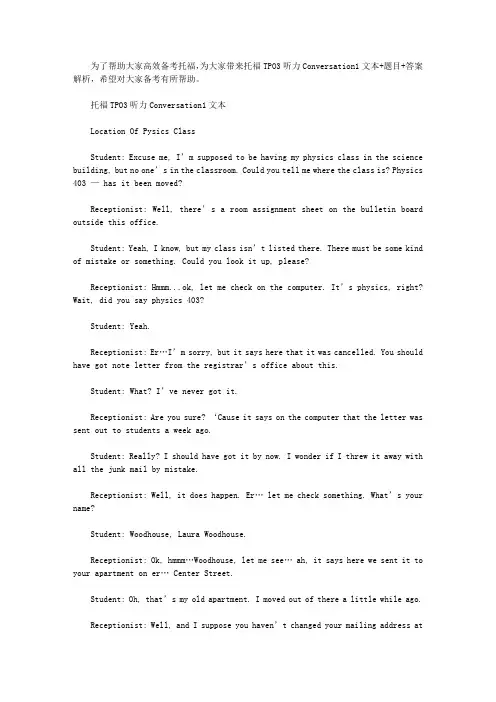
为了帮助大家高效备考托福,为大家带来托福TPO3听力Conversation1文本+题目+答案解析,希望对大家备考有所帮助。
托福TPO3听力Conversation1文本 Location Of Pysics Class Student: Excuse me, I’m supposed to be having my physics class in the science building, but no one’s in the classroom. Could you tell me where the class is? Physics 403 — has it been moved? Receptionist: Well, there’s a room assignment sheet on the bulletin board outside this office. Student: Yeah, I know, but my class isn’t listed there. There must be some kind of mistake or something. Could you look it up, please? Receptionist: Hmmm...ok, let me check on the computer. It’s physics, right? Wait, did you say physics 403? Student: Yeah. Receptionist: Er…I’m sorry, but it says here that it was cancelled. You should have got note letter from the registrar’s office about this. Student: What? I’ve never got it. Receptionist: Are you sure? ‘Cause it says on the computer that the letter was sent out to students a week ago. Student: Really? I should have got it by now. I wonder if I threw it away with all the junk mail by mistake. Receptionist: Well, it does happen. Er… let me check something. What’s your name? Student: Woodhouse, Laura Woodhouse. Receptionist: Ok, hmmm…Woodhouse, let me see… ah, it says here we sent it to your apartment on er… Center Street. Student: Oh, that’s my old apartment. I moved out of there a little while ago. Receptionist: Well, and I suppose you haven’t changed your mailing address atthe administration office. Well that would explain it. Student: Yeah, I guess that’s it. But how can they cancel the class after offering it. If I’d known this was going to happen, I would have taken it last semester. Receptionist: I know, it’s really inconvenient for you, I understand that, but er… if we don’t have enough students signed up for the course, the college can’t offer it. You know, it’s a practical issue, like we can’t have an instructor when there’re only a few students in the class. You see what I mean? Student: I guess, but now I don’t know what course I should take instead. Receptionist: Ok, let’s see. Do you have any courses you’re going to take next semester? If you do, you might want to take them now and sign up for physics 403 next semester. Student: Yeah, I guess I could do that. I just hope it won't be cancelled again. Do you know how many people have to be enrolled in order to keep a class from being cancelled? Receptionist: Well, it depends on the class, but for that class, you have to have er… let’s see, usually it’d be at least ten people, but since it was cancelled this semester, they might even do it with less. But do you know what you should do? Give the physics department a call a couple of weeks before the semester starts. They’ll be able to tell you if they’re planning to go through with it. It's their decision, actually. Student: Oh, ok, I will do that. Thanks for the info. Receptionist: No problem. Sorry about the class. Oh, why don’t you to go change a mail address now. It only takes a minute. Student: Oh, oh, sure, I will do that right way. 托福TPO3听力Conversation1题目 1.Why does the women come to the office? a) To notify the university of her change of address b) To find out where her physics class is being held c) To get directions to the science building。
为了帮助大家高效备考托福,为大家带来托福TPO51听力Conversation1文本+题目+答案解析,希望对大家备考有所帮助。
托福TPO51听力Conversation1文本 标题:Biology Experiment Reproduction Listen to part of a conversation between a student and her biology professor. Professor: So, the assignment is to reproduce one of the animal camouflage experiments we read about in our textbook. Which experiment did you pick? Student: Well, I was wondering if I can try to reproduce an experiment that’s……kind of the opposite of what we discussed in the textbook? Professor: So instead of how and why an animal might hide itself, you want to do something about why an animal might want to be seen? Em? Tell me more. Student: Well, I got the idea from one of the journals you said we should look at. It’s an experiment about ah……they called them eyes bugs in the article? Professor: Eyes bugs, sure. The patterns on the wings of moths and butterflies that are generally believed to scare off predators because they look like big eyes? Student: Yeah. Except the article was about the experiment that disputes that theory. Professor: Well, we know that the markings do scare the birds but the idea that the spots looked like eyes is……well, that is just a commonly held belief. Student: So, that’s not even based on research? Professor: Well, this whole idea moths and butterfly markings being scary because they looked like eyes, rest on how we imagine the predators, like birds, perceive the markings. And we can never really know that. All we can do is observe bird behavior. But tell me more about the experiment. Student: Ok. It said the experiment looked at the shapes of the markings on moths’ wings. The researchers wanted to know if the markings that were round and eye-shaped were more effective in deterring predators than square and rectangular markings. Professor: Ok. Student: Yeah. So they attached food to paper models of moths with different shaped marks drawn on the wings to see how birds reacted. And what’s interesting is they realized the round marks were not more effective in scaring bird than other shapes. Professor: Were they less effective? Student: No, they were about the same. But what researchers did determine is that larger markings were more effective than smaller markings scaring off prey. They call this phenomenon “visual aliveness”. Professor: Visual aliveness. Um, well, I guess that it is not all that shocking if you think about it. Student: So anyway, is it ok? Can I repeat this experiment and write about it?。
TPO51托福听力Conversation题目原文及答案解析TPO托福模考软件相信是大家用的最多的工具了,对于托福成绩的提升是非常有帮助的。
托福听力可以说是整个托福考试当中比较重要的一个部分,如何利用现有资料TPO模考软件来提升大家的托福成绩呢?今天小编在这里整理了TPO51托福听力conversation1文本+题目+答案解析来分享给大家,希望对大家托福听力备考有帮助。
TPO51托福听力Conversation1原文文本针对戏剧课的师生问答Questions About A Drama ClassListen to a conversation between a student and his drama professor.Professor: Hi Robert. So how's your paper going?Robert: Pretty well. It's a lot of work, but I’m getting into it, so I don't mind. I’ll probably have some questions for you in the next week or so.Professor: Okay. Glad to hear you’re progressing so well.Robert: Um… There was something you said at the end of the lecture on Tuesday, something about there not really being any original plays.Profes sor: There’s no such thing as an original play. Yes. That's the direct quote from Charles Mee.Robert: Mee… that's with two “e”s, right?Professor: Yep. M-E-E. You'll probably be hearing a lot about him. He's becoming a pretty famous playwright.Robert: Yeah,well, I’ve been thinking about his quote. I mean there must be some original plays out there.Professor: I’ll grant that he's overstating things somewhat. But the theater does have a long tradition of borrowing. Take Shakespeare. Like most writers of his day,he borrowed plots from other sources unabashedly. And the ancient Greeks, all the plays they wrote were based on earlier plays, poems and myths.Robert: And borrowing applies to plays being written nowadays, too?Professor: To some extent, yes. Mee, for example, he's made a career out of remaking plays, one of which we’ll be studying soon. It’s called Full Circle and Mee based it on an earlier play by a German playwright.Robert: Oh Full Circle… Wasn't that based on the Caucasian Chalk Circle?Professor: That's right.Robert: I remember hearing about that play from my acting coach.Professor: Okay. Well, the Caucasian Chalk Circle was based on a play by yet another German playwright, someone who was fascinated by the ancient literatures of China, India and Persia, and many of his works were adapted from those literatures, including his version of the Chalk Circle which was based on an early Chinese play.Robert: So this Full Circle play, by Charles Mee, the one we're going to study,it's like the third or fourth remake. Wow… And we complain that Hollywood keeps making the same movies over and over again.Professor: Well, part of what Mee’s trying to do is drive home the point that: One, theater’s always a collaborative effort.Robert: Well, yeah, the playwright, the director, the actors, people have to work together to produce a play.Professor: Yes, of course. But Mee means historically. The dramatic literature of early periods is hugely influential in shaping later dramatic works.Robert: So it's like when the playwright bases a play on a previous playwright's theme or message.It's like they're talking to each other, collaborating. Uh, just not at the same time right?Professor: Exactly. And the second point Mee's trying to make, I think, is that it's legitimate to retell an old story in a new way, in a way that’s, uh… more in line with contemporary concerns. So when playwrights reinvent or update an earlier play, it shouldn't be construed as a lack of imagination or an artistic failure.TPO51托福听力Conversation1题目及答案解析Question 1 of 5Why does the man go to see the professor?A. To discuss a play he heard aboutB. To get feedback on a paper he is writingC. To ask about a point made in classD. To get information about an acting coach你的答案:正确答案:C题目解析:本题定位到原文:Robert: Um… There was something you said at the end of the lecture on Tuesday, something about there're not really being any original plays. 此处原文的大意是:学生提到教授上节课说其实没有完全原创的戏剧。
?小编给考生们带来了托福TPO53口语文本+题目及下载,希望大家多做题,多积累、多研究,有针对性的规划考试。
Task1QuestionTalk about a special gift you once gave someone. Describe the gift andexplain why it was special.示例回答:One special gift I gave to my boyfriend was a bronze ring from his favoritemovie, the Lord of the Rings. It looks exactly like the ring showed in themovie, with the words ‘one ring controls them all’ engraved on, and fitsperfectly on his index finger. The reason why I picked it up for his birthdaywas that he loves this movie series so much and every time, to be honest, forreal every time when we are wandering in the mall, he would visit every jewelryshop to look for the similar ring. And he even wishes to have our wedding ringengraved with the same words on. He’s cute, right? So when I gave this ring tohim, he started to wear it every time we went out for our date! Isn’t it sospecial?索取“TPO53口语范文”,请加sunny老师微信(shnc_2018),发送暗号“TPO53”Task2QuestionWhen some people have a little extra money, they like to spend it rightaway on something they enjoy. Others prefer to save the extra money. Which doyou like to do? Explain why.示例回答:I will definitely save it up, because this money could promise my life standard even though I will have a big cost. For example, before my marriage, I used to spend all of my salary for fun. I love traveling so usually I planned 3 or 4 trips a year. But, when one day I considered buying my own apartment and getting into marriage, I found nothing from my bank savings. I felt myself in total despair. So I loaned a lot of money from the bank. And ever since then, my life changed. I began to work very hard, cut all my travel plans, and save every extra penny for my savings. What a painful experience!Task3University Announces Energy-Saving PlanOut of concern for the environment, the university has announced an effortto reduce energy consumption. The energy saving measures will start at the library. One measure involves the library’s inside lighting: new overhead lights that use less power will be installed throughout the building. Another measure has to do with the temperature level in the library. The air-conditioning will be reduced on hot days, meaning that study areas will be kept somewhat warmer when it is hot outside.Question:The woman expresses her opinion of the university's plan. State her opinion and explain the reasons she gives for holding that opinion.Task4Chaining BehaviorMany everyday human behaviors are made up of a sequence of several simpler behaviors. In order to teach children to perform these complex behaviors,。
托福听力tpo53lecture1、2、3、4原文+题目+答案+译文Lecture1 (1)原文 (1)题目 (4)答案 (5)译文 (6)Lecture2 (8)原文 (8)题目 (10)答案 (12)译文 (12)Lecture3 (14)原文 (14)题目 (16)答案 (18)译文 (18)Lecture4 (20)原文 (20)题目 (22)答案 (24)译文 (24)Lecture1原文NARRATOR:Listen to part of a lecture in a film studies class.MALE PROFESSOR:Nowadays,we take sound in films for granted—I mean,you stillmight see black and white films occasionally,but you hardly ever see silent films anymore.So it's interesting to note that the use of recorded sound was originally controversial FEMALE STUDENT:What about all the sounds you hear in some silent movies?Like, you know a loud sound when somebody falls down or something?MALE PROFESSOR:OK,you're talking about a soundtrack added much later,which has,over time,become part of the film we know.But this recorded track didn't exist then.And it's not that most people didn't want sound in films;it's just that the technology wasn't available yet.Don't forget that instead of recorded sound there was often live music that accompanied movies in those days—like a piano player or a larger orchestra in the movie theater.Also,think of the stage,the live theater—it has used wonderful sound effects for a long time and,if wanted,these could be produced during the viewing of a film.You know,the rolling of drums for thunder or whatever.But that wasn't as common.Oh,and another thing that they might have in movie theaters in the early days was a group of live actors reading the parts to go along with the film.Or—and this seems a particularly bad idea to us now—one person narrating the action…an early example of a long tradition of movie producers—the ones concerned mostly about making money—not having much confidence in their audience,thinking that people somehow couldn’t follow the events otherwise.So,it finally became possible to play recorded sound as part of the film in the1920s. Trouble was,it wasn't always used to very good effect.First,it was,you know, amazing to see somebody's mouth move at the same time you hear the words…or hear a door close when you see it closing on-screen.But that luster wears off,of course,and if you're a director,a filmmaker,what's the next step?FEMALE STUDENT:Well,use sound to enhance the movie,right?Bring something more to it that wasn't possible…MALE PROFESSOR:Yes,that's exactly what directors who were more interested in cinema as art,not commerce,were thinking.But they also predicted that there would be a problem that sound would be misused, and,boy,was it ever…Because the commercial types,the producers and so on were thinking,OK,now that sound is possible,let's talk as much as possible and forget about the fact that we're making a movie,that we have this powerful visual medium.So,many of the films of the twenties were basically straight adaptations of successful shows from the stage,theater.The name they used for sound films then was"talking films,"and that was on the mark,since,well,all they pretty much did was talk.And talk.So,the remedy?Well,what was proposed by a number of filmmakers and theorists was the creative,expressive use of sound—what they generally called nonsynchronous sound.OK,synchronous sound means basically that what we hear is what we see. Everything on the soundtrack is seen on the screen.And everything was recorded simultaneously,which,well,since the sound technicians working on films often had experience with live radio,that made sense to them.Recording the sound separately and adding it in afterward—well that idea was less obvious.Anyway,synchronous sound means the source of the sound is the image on the screen.Nonsynchronous sound then,is…FEMALE STUDENT:The sound doesn't match the picture?MALE PROFESSOR:Right.Now we can look at this in various ways,but let's take it as literally as possible.Music—unless we see the radio or the orchestra—that's nonsynchronous.If the camera shot is of the listener rather than the speaker,that's nonsynchronous.If wehear,say,background sounds that aren't on the screen—that's nonsynchronous.So,that doesn't seem so radical,does it?But,again,those early producers didn't think their audiences could keep up with this.FEMALE STUDENT:Excuse me,but did you say earlier that some filmmakers actually advocated not using sound at all?MALE PROFESSOR:Well,yes,but that was a bit of an exaggeration,I guess.What I meant to say was that some filmmakers thought that the way the film sound was actually used was setting the art of filmmaking back.But everyone agreed that sound solved some very difficult issues,and offered potentially exciting tools.题目1.What is the lecture mainly about?A.The influence of theater on early sound filmsB.Conflicting views on uses of sound during the early days of sound filmsC.The great progress in cinema after the development of soundD.Viewer reactions to early sound films2.According to the professor,what types of sound were used in silent film theaters? [Click on3answers]A.Live music performed in the theaterB.Sound effects created in the theaterC.Recorded sound tracks played with the filmD.Live narration during the filmE.Musical entertainment offered before the film3.What is the professor's attitude toward early movie producers?A.He is critical of their influence on films.B.He thinks they had little influence on films.C.He thinks they understood what audiences wanted.D.He acknowledges that they made progress possible.4.According to the professor,what was characteristic of sound films in the1920s?A.Dialogues between characters were kept to a minimum.B.Many films were closely based on theater plays.C.Musical sound tracks were added to most films.D.Sounds were recorded separately and added to films later.5.What is an example of synchronous sound in a film?A.A character hearing a train that is not visibleB.A past conversation being replayed in a character's mindC.A character playing guitar and singing on screenD.A song playing at the end of a film as credits appear on the screen答案B ABD A B C译文Narrator:请听一段电影研究讲座的节选。
托福听力tpo53section2对话讲座原文+题目+答案+译文Conversation2 (1)原文 (1)题目 (3)答案 (5)译文 (5)Lecture3 (7)原文 (7)题目 (9)答案 (11)译文 (11)Lecture4 (13)原文 (13)题目 (15)答案 (17)译文 (17)Conversation2原文NARRATOR:Listen to a conversation between a student and the cafeteria manager. MALE MANAGER:Oh,hi,uh,you're Amy,right?FEMALE STUDENT:Yes.MALE MANAGER:I haven't seen you here for a while.Welcome back.FEMALE STUDENT:Thanks,er,you're right,I haven't been eating here regularly like I used to.MALE MANAGER:Why not?FEMALE STUDENT:Couple of reasons.First of all,I have a class that ends during lunchtime.So,by the time I get here,there’s hardly any food left.MALE MANAGER:Really?FEMALE STUDENT:Yeah.And then,I have chemistry lab at night this semester.It's two hours every Tuesday and Thursday.Y’know,that building's way across campus. So I just eat something in my dorm before I leave,or skip dinner altogether.I’d come here afterward,but lab lets out at seven-thirty,and by then,the cafeteria’s already closed.MALE MANAGER:Oh,I’m really sorry.Uh,what about getting something to go and eating it in class?FEMALE STUDENT:I can't.Food isn't permitted anywhere near the laboratories.I wish you stayed open later.MALE MANAGER:Have you complained formally?We've always had a suggestion box, and now,you can send us an e-mail.FEMALE STUDENT:As a matter of fact,I did fill out a suggestion card.I asked for longer hours and for better food choices,too.But,that was,like,weeks ago,and nothing's changed,from what I can see.MALE MANAGER:Y'know,I was just promoted to cafeteria manager,and one of the things I'm trying to do is pay more attention to students’concerns.There have been a lot of complaints similar to yours over the yearsFEMALE STUDENT:Yeah,a lot of my friends complain about the cafeteria,but wefigure nothing will ever be done.MALE MANAGER:Well,some things can change.For instance,you mentioned you'd like better food choices.Is there anything in particular you'd like added to our menu?FEMALE STUDENT:I guess it'd be nice to get hot cereal in the morning,and maybe a wider choice of soups and salads at lunch and dinner.And,there should definitely be enough food to feed everyone whenever the cafeteria’s open.MALE MANAGER:Hmmm.All good suggestions.Say,were you aware that the university has recently formed a food advisory committee?It includes myself,a nutritionist,the school chef,a food-science professor,and the person who oversees the cafeteria budget.FEMALE STUDENT:Do you want me to talk to the committee?MALE MANAGER:I was thinking you might like to serve on the committee.If you're interested,I’ll recommend you as the student representative.FEMALE STUDENT:Ohhhh,I'm not sure if I have enough spare time to get that involved.MALE MANAGER:OK,then,why don't I let you know when and where our next meeting is,and we’ll put you on the agenda?You may also want to send me an e-mail with all of your suggestions.Now that I'm in charge,I'll make sure they'll get serious consideration.FEMALE STUDENT:I'd appreciate that.Thanks!题目1.What are the speakers mainly discussing?A.The man's recent promotion to cafeteria managerB.The agenda for an upcoming committee meetingC.Ways to improve the food service in the cafeteriaD.Recent changes to the cafeteria's menu2.Why has the woman stopped going to the cafeteria regularly?A.She does not like the cafeteria food.B.She started eating with friends in the dormitory.C.Her classes conflict with the cafeteria's hours of operation.D.The cafeteria is located too far away from her dormitory.3.What are the woman's main complaints about the cafeteria food?[Click on2 answers]A.It is not varied enough.B.It is not kept hot enough.C.It cannot be taken out of the cafeteria.D.It is not available in sufficient quantities.4.What is the woman's attitude toward joining the advisory committee?A.She is flattered to be invited to serve on the committee.B.She is doubtful that she can fit it into her schedule.C.She is concerned that her participation would not make a difference.D.She is curious to learn more about the committee.5.What does the man imply when he says this:(MALE MANAGER)Y'know,I was recently promoted to cafeteria manager,and one of the things I'm trying to do is pay more attention to students'concerns.There have been a lot of complaints similar to yours over the years.A.The suggestion box was recently set up.B.The former managers were not very responsive to students’complaints.C.The cafeteria policies are not likely to change in the future.D.The manager plans to raise the salaries of the cafeteria staff.答案C C AD B B译文旁白:请听一段学生和餐厅经理的谈话。
tpo53三篇托福阅读TOEFL原文译文题目答案译文背景知识阅读-1 (2)原文 (2)译文 (5)题目 (8)答案 (16)背景知识 (18)阅读-2 (21)原文 (21)译文 (24)题目 (27)答案 (34)背景知识 (36)阅读-1原文Evidence of the Earliest Writing①Although literacy appeared independently in several parts of the prehistoric world,the earliest evidence of writing is the cuneiform Sumerian script on the clay tablets of ancient Mesopotamia,which, archaeological detective work has revealed,had its origins in the accounting practices of commercial activity.Researchers demonstrated that preliterate people,to keep track of the goods they produced and exchanged,created a system of accounting using clay tokens as symbolic representations of their products.Over many thousands of years,the symbols evolved through several stages of abstraction until they became wedge-shaped(cuneiform)signs on clay tablets, recognizable as writing.②The original tokens(circa8500B.C.E.)were three-dimensional solid shapes—tiny spheres,cones,disks,and cylinders.A debt of six units of grain and eight head of livestock,for example might have been represented by six conical and eight cylindrical tokens.To keep batches of tokens together,an innovation was introduced(circa3250B.C.E.) whereby they were sealed inside clay envelopes that could be brokenopen and counted when it came time for a debt to be repaid.But because the contents of the envelopes could easily be forgotten, two-dimensional representations of the three-dimensional tokens were impressed into the surface of the envelopes before they were sealed.Eventually,having two sets of equivalent symbols—the internal tokens and external markings—came to seem redundant,so the tokens were eliminated(circa3250-3100B.C.E.),and only solid clay tablets with two-dimensional symbols were retained.Over time,the symbols became more numerous,varied,and abstract and came to represent more than trade commodities,evolving eventually into cuneiform writing.③The evolution of the symbolism is reflected in the archaeological record first of all by the increasing complexity of the tokens themselves. The earliest tokens,dating from about10,000to6,000years ago,were of only the simplest geometric shapes.But about3500B.C.E.,more complex tokens came into common usage,including many naturalistic forms shaped like miniature tools,furniture,fruit,and humans.The earlier,plain tokens were counters for agricultural products,whereas the complex ones stood for finished products,such as bread,oil, perfume,wool,and rope,and for items produced in workshops,such as metal,bracelets,types of cloth,garments,mats,pieces of furniture, tools,and a variety of stone and pottery vessels.The signs marked onclay tablets likewise evolved from simple wedges,circles,ovals,and triangles based on the plain tokens to pictographs derived from the complex tokens.④Before this evidence came to light,the inventors of writing were assumed by researchers to have been an intellectual elite.Some,for example,hypothesized that writing emerged when members of the priestly caste agreed among themselves on written signs.But the association of the plain tokens with the first farmers and of the complex tokens with the first artisans—and the fact that the token-and-envelope accounting system invariably represented only small-scale transactions—testifies to the relatively modest social status of the creators of writing.⑤And not only of literacy,but numeracy(the representation of quantitative concepts)as well.The evidence of the tokens provides further confirmation that mathematics originated in people’s desire to keep records of flocks and other goods.Another immensely significant step occurred around3100 B.C.E.,when Sumerian accountants extended the token-based signs to include the first real numerals. Previously,units of grain had been represented by direct one-to-one correspondence―by repeating the token or symbol for a unit of grain the required number of times.The accountants,however,devisednumeral signs distinct from commodity signs,so that eighteen units of grain could be indicated by preceding a single grain symbol with a symbol denoting“18.”Their invention of abstract numerals and abstract counting was one of the most revolutionary advances in the history of mathematics.⑥What was the social status of the anonymous accountants who produced this breakthrough?The immense volume of clay tablets unearthed in the ruins of the Sumerian temples where the accounts were kept suggests a social differentiation within the scribal class,with a virtual army of lower-ranking tabulators performing the monotonous job of tallying commodities.We can only speculate as to how high or low the inventors of true numerals were in the scribal hierarchy,but it stands to reason that this laborsaving innovation would have been the brainchild of the lower-ranking types whose drudgery is eased.译文最早文字的证据①虽然读写能力是在史前世界的几个地方分别出现的,但书写的最早证据是古代美索不达米亚泥板上的苏美尔楔形文字,根据考古探查工作揭示,它起源于商业活动的会计实践。
为了帮助大家高效备考托福,为大家带来托福TPO53听力Conversation1文本+题目+答案解析,希望对大家备考有所帮助。
托福TPO53听力Conversation1文本
Listen to a conversation between a student and his drama professor.
Professor: Hi Robert. So how's your paper going?
Robert: Pretty well. It's a lot of work, but I’m getting into it, so I don't mind. I’ll probably have some questions for you in the next week or so.
Professor: Okay. Glad to hear you’re progressing so well.
Robert: Um… There was something you said at the end of the lecture on Tuesday, something about there not really being any original plays.
Professor: There’s no such thing as an original play. Yes. That's the direct quote from Charles Mee.
Robert: Mee… that's with two “e”s, right?
Professor: Yep. M-E-E. You'll probably be hearing a lot about him. He's becoming a pretty famous playwright.
Robert: Yeah,well, I’ve been thinking about his quote. I mean there must be some original plays out there.
Professor: I’ll grant that he's overstating things somewhat. But the theater does have a long tradition of borrowing. Take Shakespeare. Like most writers of his day, he borrowed plots from other sources unabashedly. And the ancient Greeks, all the plays they wrote were based on earlier plays, poems and myths.
Robert: And borrowing applies to plays being written nowadays, too?
Professor: To some extent, yes. Mee, for example, he's made a career out of remaking plays, one of which we’ll be studying soon. It’s called Full Circle and Mee based it on an earlier play by a German playwright.
Robert: Oh Full Circle… Wasn't that based on the Caucasian Chalk Circle?
Professor: That's right.
Robert: I remember hearing about that play from my acting coach.
Professor: Okay. Well, the Caucasian Chalk Circle was based on a play by yet another German playwright, someone who was fascinated by the ancient literature of China, India and Persia, and many of his works were adapted from those literatures, including his version of the Chalk Circle which was based on an early Chinese play.
Robert: So this Full Circle play, by Charles Mee, the one we're going to study, it's like the third or fourth remake. Wow… And we complain that Hollywood keeps making the same movies over and over again.
Professor: Well, part of what Mee’s trying to do is drive home the point that: One, theater’s always a collaborative effort.
Robert: Well, yeah, the playwright, the director, the actors, people have to work together to produce a play.
Professor: Yes, of course. But Mee means historically. The dramatic literature of early periods is hugely influential in shaping later dramatic works.
Robert: So it's like when the playwright bases a play on a previous playwright's theme or message.It's like they're talking to each other, collaborating. Uh, just not at the same time right?
Professor: Exactly. And the second point Mee's trying to make, I think, is that it's legitimate to retell an old story in a new way, in a way that’s, uh… more in line with contemporary concerns. So when playwrights reinvent or update an earlier play, it shouldn't be construed as a lack of imagination or an artistic failure.
托福TPO53听力Conversation1题目
1.Why does the man go to see the professor?
A. To discuss a play he heard about
B. To get feedback on a paper he is writing
C. To ask about a point made in class
D. To get information about an acting coach
2.Why does the professor mention Shakespeare and the ancient Greek playwrights?
A. To support her statement that some original plays do exist。